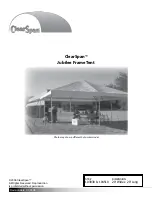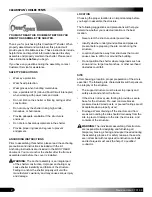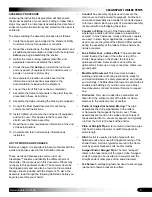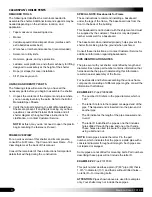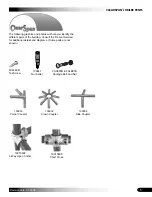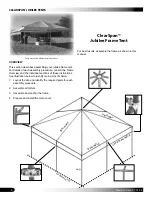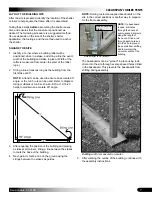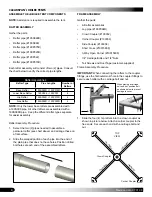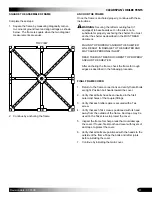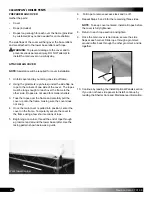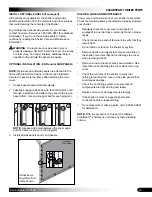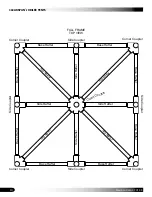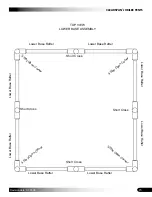
CLEARSPAN
™
JUBILEE TENTS
4
Revision date: 07.01.08
REQUIRED TOOLS
The following list identifies the main tools needed to
assemble the shelter. Additional tools and supports may be
needed depending on the structure, location, and
application.
Tape measure or measuring device
•
Marker
•
Variable speed drill and impact driver (cordless with
•
extra batteries works best)
Wrenches or ratchet and socket set (recommended)
•
Scissors or utility knife
•
Hammers, gloves, and eye protection
•
Ladders, work platforms, and other machinery for lifting
•
designed to work safely at the height of the shelter
Rope (or straps) for cover installation
•
5/16" Hex key wrench
•
UNPACK AND IDENTIFY PARTS
The following steps will ensure that you have all the
necessary parts
before
you begin to assemble the shelter.
Unpack the contents of the shipment and place where
1.
you can easily inventory the parts. Refer to the Bill of
Materials/Spec Sheets.
Verify that all parts listed on the Bill of Materials/Spec
2.
Sheets are present. If anything is missing or you have
questions, consult the Pictorial Parts Guide and all
shelter diagrams throughout these instructions for
clarification, or contact Customer Service.
NOTE:
At this time, you do not need to open the plastic
bags containing the fasteners (if used).
FRAME OVERVIEW
For a quick overview of this shelter and its components,
consult the Full Frame - Top View and Lower Frame - Top
View diagrams at the back of this manual.
Consult the remainder of these instructions for important
details that will help during the construction.
SPECIAL NOTE: Baseboards for Frame
These instructions recommend installing a baseboard
under the legs of the frame. The baseboard runs from the
front to the back of the building.
This baseboard is
not included
with the shipment and must
be supplied by the customer. Treated or recycled plastic
lumber works well for a baseboard.
The baseboard, when installed properly, helps prevent the
shelter from sinking into the ground when anchored.
Consult these instructions, or contact Customer Service for
additional information regarding baseboards.
PIPE IDENTIFICATION NOTES
The pipe sent with your shelter is identified by length and
diameter. Each pipe part number contains information that
helps describe the pipe. Understanding this information
results in easier assembly of the frame.
For best results and
before assembling the various frame
components
consisting of different pipe lengths, consult the
information that follows:
EXAMPLE #1:
Pipe #190S099D
The number 190 refers to the pipe diameter, which is
•
1.90".
The letter S refers to the tapered or swaged end of the
•
pipe. This tapered end is inserted into the plain end of
another pipe.
The 99 indicates the length of the pipe measured end-
•
to-end.
The letter D indentifies the pipe as one that includes
•
holes drilled through the pipe and one or both ends.
These holes are used to secure the pipe to a coupler
using a bolt and nut.
NOTE:
Some pipes include the letter P in the part
number, which indicates that the pipe is a plain pipe with a
consistent diameter throughout its length. Such pipes are
not tapered or swaged.
Some pipes are not drilled for mounting bolts. Part numbers
describing these pipes will not include the letter D.
EXAMPLE #2:
Pipe #131P063
This part number desribes a plain (P) 63" pipe (63) that is
1.315" in diameter (131) and that is without drilled holes—
no letter D—for mounting bolts.
ATTENTION:
Pipes shown above are used for examples
only. Your shelter may not include these pipes.

